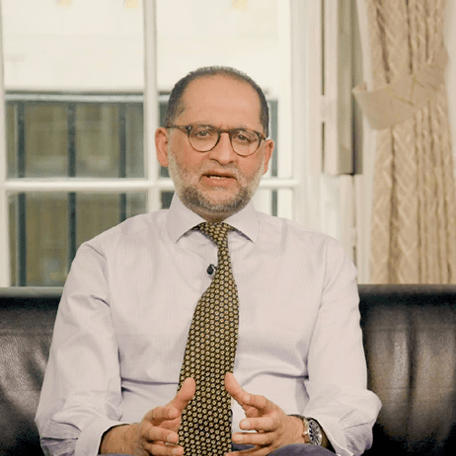The Year of the Rabbit was another tough year for the Chinese market; hopes for a swift economic recovery following the relaxation of Covid rules proved too optimistic. Consumer sentiment has been weak and concerns around the property sector have persisted. However, despite a generally negative narrative around China, there have been some bright spots: recent months have seen evidence of a stabilisation in primary property sales and China’s trade surplus has improved, aided by its success capturing the dominant share of electric vehicle (EV) sales. As a new lunar year begins on 10 February, we ask ourselves what the Year of the Dragon will bring to the markets and frame our thoughts around three themes.
Very attractive valuations
The Chinese benchmark’s price/earnings (p/e) multiple is now trading near a decade low of around 10x, more than one standard deviation below its five-year average and at a ~25% discount to emerging markets. This could be a good entry point into one of the world’s largest economies and Chinese corporates seem to agree: 2023 was a two decade high for share buybacks, hitting HKD100 billion. This reflects the confidence the companies themselves have in their business outlook and their choice to seize the opportunity of low valuations.
There is no doubt a lot of negativity surrounding investment in China, including poor consumer sentiment, the ongoing property crisis and a declining population. However, the negatives look to be largely priced in already.
Furthermore, expectations are low compared to last year when there were hopes of a strong rebound following the relaxation of Covid restrictions. This year will also have a low base for comparison, making it easier to surprise to the upside. The investor community just needs a catalyst to trigger renewed interest.
Policy support and stimulus
Policy has always played a key role in investing in China and we have started seeing increased policy support for various industries, particularly the property sector. While the effects will take time, this could gradually revive investor confidence. As Beijing is keen to revive economic growth, we believe it is likely that there will be further policy support in 2024, and indeed a further RRR cut was announced in recent weeks.
The National People's Congress in March is expected to provide a goal for this year’s growth rate and an outline for the year’s priorities and policy direction. So far, easing measures have fallen short of investor expectations, so if we were to see a step up to a more comprehensive easing package, this could provide the impetus the market needs. Focused stimulus on consumption would also be well received; consumer spending has remained subdued so any moves to encourage a consumption-led recovery would be positive.
At the end of 2023, regulatory fears re-emerged when a draft proposal was released outlining plans for a spending cap on players of online games. However, the regulator acted swiftly to allay fears and has since accelerated game approvals, removed the head of the department responsible for the news release and now also removed the draft from its website. These have all been encouraging developments and illustrate support for the private sector going forward.
The government has also recently called for measures to stabilise the market; this could help provide a backstop for equities, increasing both sentiment and liquidity. This, combined with further stimulus, could provide investors with the confidence they need to step back into the Chinese market.
US geopolitics
Political tensions between China and the US have increased in past years and US efforts to restrict tech exports have particularly impacted Chinese companies involved in semiconductors, microelectronics and artificial intelligence. However, there have been some positive signs lately: the China-US economic and financial working groups both held formal meetings in recent months. Biden met with foreign minister Wang Yi in October and expressed desire for the two sides to work to stabilise the relationship. Biden also met Xi Jinping in person last November, which led to the resumption of diplomatic and military dialogue.
One sticking point between the two nations has been the status of the democratic island of Taiwan, which China claims as its own and the US has stated it will defend in the case of a Chinese invasion. The DPP, a party favouring economic and political distance from China, was re-elected in Taiwan in January. This potentially lays the groundwork for increased cross-strait tensions. However, with the loss of majority in the legislature, the DPP’s power may be limited which is good news for risk going forward.
This is also an election year in the US and so the Year of the Dragon holds potential for interesting developments in the relationship between the two nations. We believe it is unlikely that either candidate would be willing to be seen as soft on China, however we will be looking for a stable framework for addressing the bilateral relationship in the next administration’s policy agenda.
KEY RISKS
Past performance is not a guide to future performance. The value of an investment and the income generated from it can fall as well as rise and is not guaranteed. You may get back less than you originally invested.
The issue of units/shares in Liontrust Funds may be subject to an initial charge, which will have an impact on the realisable value of the investment, particularly in the short term. Investments should always be considered as long term. Overseas investments may carry a higher currency risk. They are valued by reference to their local currency which may move up or down when compared to the currency of the Fund. This Fund may have a concentrated portfolio, i.e. hold a limited number of investments. If one of these investments falls in value this can have a greater impact on the Fund's value than if it held a larger number of investments. The Fund may encounter liquidity constraints from time to time. The spread between the price you buy and sell shares will reflect the less liquid nature of the underlying holdings. Investments in emerging markets may involve a higher element of risk due to less well-regulated markets and political and economic instability. This may result in higher volatility and larger drops in the value of the fund over the short term. Outside of normal conditions, the Fund may hold higher levels of cash which may be deposited with several credit counterparties (e.g. international banks). A credit risk arises should one or more of these counterparties be unable to return the deposited cash. Counterparty Risk: any derivative contract, including FX hedging, may be at risk if the counterparty fails.
DISCLAIMER
This is a marketing communication. Before making an investment, you should read the relevant Prospectus and the Key Investor Information Document (KIID), which provide full product details including investment charges and risks. These documents can be obtained, free of charge, from www.liontrust.co.uk or direct from Liontrust. Always research your own investments. If you are not a professional investor please consult a regulated financial adviser regarding the suitability of such an investment for you and your personal circumstances.
This should not be construed as advice for investment in any product or security mentioned, an offer to buy or sell units/shares of Funds mentioned, or a solicitation to purchase securities in any company or investment product. Examples of stocks are provided for general information only to demonstrate our investment philosophy. The investment being promoted is for units in a fund, not directly in the underlying assets. It contains information and analysis that is believed to be accurate at the time of publication, but is subject to change without notice. Whilst care has been taken in compiling the content of this document, no representation or warranty, express or implied, is made by Liontrust as to its accuracy or completeness, including for external sources (which may have been used) which have not been verified.












